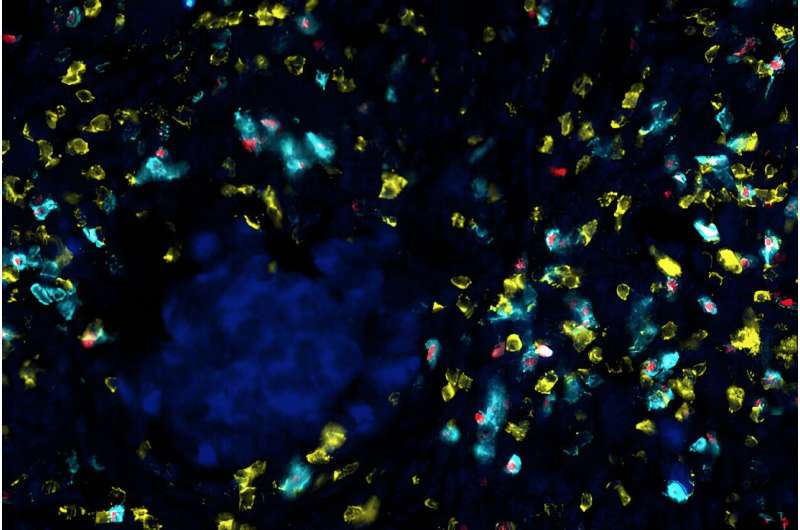This article has been reviewed according to Science X's editorial process and policies. Editors have highlighted the following attributes while ensuring the content's credibility:
fact-checked
peer-reviewed publication
trusted source
proofread
'Cutting the cable' between CD8+ T and T regulatory cells enhances checkpoint immunotherapy

Checkpoint immunotherapy utilizing PD-1 blockade has become the standard of care for metastatic melanoma. While this treatment is effective in 40% of patients, the other 60% develop resistance, leading to tumor regrowth. A multidisciplinary research team led by the University of California, Irvine has identified a new strategy that could enhance the therapeutic effectiveness of this therapy by targeting the communication between immune cells within the tumor.
In a study published online today in the journal Cancer Cell, researchers demonstrate that while PD-1 blockade activates a potent antitumor response in CD8+ T cells, it also promotes the accumulation of T regulatory cells, decreasing the immune response against the tumor. The activation of these competing signals—one set combating the tumor and the other restraining the immune system—is likely a significant challenge in providing effective cancer treatment.
"Our latest research reveals that CD8+ T cells, activated by PD-1 blockade to target melanoma, also interact with T regulatory cells, which subsequently dampen the immune response against the tumor," said corresponding author Francesco Marangoni, UC Irvine assistant professor of physiology & biophysics.
"We analyzed the intricate dynamics of communication between CD8+ T and T regulatory cells, which are analogous to two telephone landlines connected by a cable. If we cut the cable, the CD8+ T cells won't be able to 'call' the T regulatory cells and instruct them to inhibit the immune response to the cancer."
Team members focused on the mechanism of communication between CD8+ T and T regulatory cells in tumors and identified a pivotal role for a molecule called ICOS, which is required for T cell activation. They found that by neutralizing ICOS and PD-1, CD8+ T cells increased their activity against the tumor but could no longer stimulate T regulatory cells.
"Our work helped identify a reason why some patients treated with checkpoint blockade develop resistance to it," said first author Shannon Geels, a UC Irvine graduate student researcher in the Department of Physiology & Biophysics. "We found that communication between cells can lead to immunotherapy failure and that we can improve efficacy by interrupting specific messages exchanged by immune cells."
The next phase of this research involves understanding the complex communication network among various cell types in a tumor.
"We do not think there is only one 'phone cable' to cut," Marangoni said. "Our findings provide a promising pathway to increasing our understanding of communication among all cell types within a tumor. This will enable us to identify the messages that block the full potential of CD8+ T cells stimulated by PD-1 blockade so that we can maximize the benefit to patients."
Other UC Irvine team members included faculty and graduate students from the physiology & biophysics, biological chemistry, dermatology and developmental & cell biology departments; the Institute for Immunology; the Center for Complex Biological Systems; and the NSF-Simons Center for Multiscale Cell Fate Research; as well as faculty from Saint John's Cancer Institute in Santa Monica; the University of Alabama at Birmingham; and Massachusetts General Hospital and Harvard Medical School.
More information: Harvard Medical School, University of California, Interruption of the Intratumor CD8+ T cell:Treg Crosstalk Improves the Efficacy of PD-1 Immunotherapy, Cancer Cell (2024). DOI: 10.1016/j.ccell.2024.05.013. www.cell.com/cancer-cell/fullt … 1535-6108(24)00181-8



















